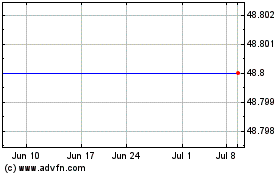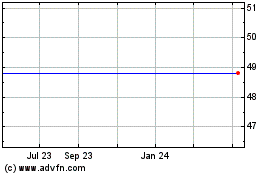In Trump Age, Taking a Different Tack on Workplace Diversity
February 14 2017 - 9:29AM
Dow Jones News
By John Simons
A new political era has corporate diversity chiefs rethinking
their roles.
Donald Trump's upset election victory caused shock waves among
many traditional politicians who realized that a swath of American
voters -- many white, working class -- felt left out. The same
realization is causing companies to re-examine what they do to
ensure an inclusive workplace, from incorporating white men into
their diversity efforts to looking for bottom-line evidence of the
benefits of such programs.
"The discourse in the U.S. presidential election, even though
rancorous, was a sharp reminder that we need to address a broader
set of diversity dimensions, in particular, socioeconomic
opportunity," says Kara Helander, a former diversity chief for
Blackrock Inc. who continues to advise the firm.
She says leaders must recognize that some workers may resent or
feel excluded by diversity efforts focused on opportunities for
workers from under-represented ethnic backgrounds, or those who
identify as lesbian, bisexual, gay or transgender.
Many executives who run diversity programs also worry that the
policy momentum that helped fuel their efforts is set to fade.
Former President Barack Obama pushed through a series of rules
rewarding diversity in the workplace, including through executive
orders that set guidelines for pay and hiring and that addressed
workplace protections for gay and transgender people. The Trump
administration hasn't detailed proposals on these issues but the
president has pledged to deregulate and vowed to rescind many of
Mr. Obama's executive orders.
In the wake of the election, some diversity professionals felt
the need "to scramble to have conversations and put together
positions" defending their work, says Mary-Frances Winters, a
consultant who has advised American Airlines Group Inc. and Walt
Disney Co. on diversity issues.
Some diversity chiefs have taken on new roles as peacemakers,
attempting to maintain workplace harmony after an election that
divided employees along race, class, gender and ideological
lines.
On the day after the election, Ms. Winters held an online
seminar for diversity executives and heads of corporate ethnic- and
gender-based employee groups. She encouraged the participants to
help employees talk about their differences while seeking common
ground.
Ms. Helander now encourages Blackrock's leaders to cultivate
teams by recruiting from an expanded pool of colleges and
universities or focusing workforce development efforts on regions
that have lost manufacturing jobs, she says.
Executives say they are looking critically at how they go about
their work, "hearing from white men the same way you'd hear from a
woman or someone who's LGBT," especially if they feel they're
missing out on career development or other workplace opportunities,
says Janese Murray, vice president of diversity and inclusion at
energy giant Exelon Corp.
Rather than simply instructing white male middle managers on the
proper ways to conduct themselves in a diverse workplace, Ms.
Murray suggests inviting them to round-table discussions with women
and minorities and encouraging them to air concerns.
"We have to be much sharper at our game than we've ever been,
and make sure that we don't give back the progress we've made,"
says Rohini Anand, global chief diversity officer at food-services
and facilities-management firm Sodexo SA.
Dr. Anand says that in the current environment executives in her
position should collect, analyze and share data validating their
work. She points to a study she conducted of 50,000 of the
company's managers, partly to demonstrate to her bosses that gender
balance on teams correlated with improved financial performance,
employee engagement and client retention. Her study found that
teams with a male-female ratio of between 40% and 60% deliver
optimal results.
As a result, Sodexo Chief Executive Michel Landel has set a goal
that women will represent at least 40% of Sodexo's senior
leadership -- its top 1,400 executives -- by 2025. Ten percent of
senior executives' annual bonuses are tied to their progress toward
that goal, Dr. Anand says.
Worried that federal guidelines on hiring diversity and
inclusion could be weakened in an overall deregulatory push,
Allison Green, chief diversity officer at Lincoln Financial Group,
called an informal meeting with the company's in-house employment
attorney in the days following the election.
Portions of the Dodd-Frank financial regulatory overhaul, which
Mr. Trump and the Republican congressional leadership have vowed to
roll back, encourage companies to create voluntary standards for
diversity in employment and in suppliers. Lincoln Financial's
policies mirror the tenets of the Dodd-Frank guidelines, and Ms.
Green says she wanted to ensure that her colleagues remained
committed.
At the meeting, Ms. Green got straight to the point: "Even if
Dodd-Frank goes away, I think this is a good policy to keep and
leverage," she told the attorney. He agreed, she says.
(END) Dow Jones Newswires
February 14, 2017 09:14 ET (14:14 GMT)
Copyright (c) 2017 Dow Jones & Company, Inc.
Exelon (NYSE:EXC)
Historical Stock Chart
From Mar 2024 to Apr 2024

Exelon (NYSE:EXC)
Historical Stock Chart
From Apr 2023 to Apr 2024
